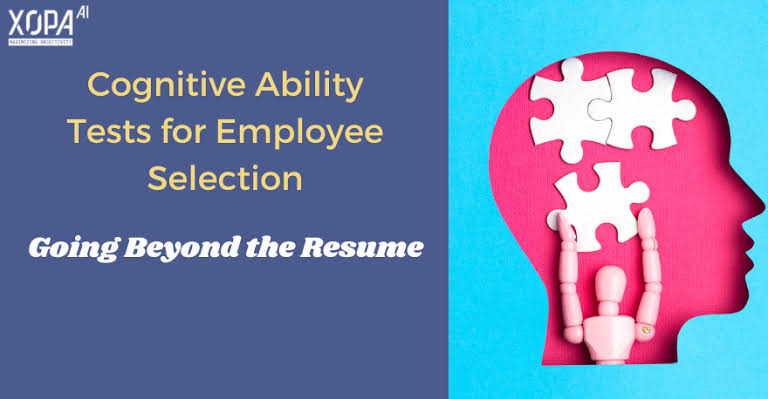The Role of Cognitive Tests in Recruitment
6 min read
In the fast-paced world of modern recruitment, the quest for the perfect candidate often feels like searching for a needle in a haystack. Resumes and interviews can only reveal so much about a person’s potential, leaving recruiters grappling with uncertainty about who will truly excel in the role.
Enter cognitive tests – the unsung heroes of recruitment. In this blog, we’ll delve into the pivotal role these tests play in uncovering the hidden talents and abilities of job applicants. But we won’t stop there. We’ll also explore how supplementary assessments like the enneagram test and emotional intelligence test can enrich our understanding of candidates, painting a more complete picture of their capabilities.
Gone are the days of relying solely on gut feelings or surface-level qualifications to make hiring decisions. Today, recruiters are harnessing the power of cognitive assessments to unlock the full potential of their talent pool. So, join us as we unravel the mysteries behind cognitive tests and discover how they’re reshaping the landscape of recruitment, one assessment at a time.
Understanding Cognitive Tests
Cognitive tests are like the hidden keys that unlock the door to a candidate’s true potential. But what exactly are they? In simple terms, cognitive tests are assessments designed to measure a person’s cognitive abilities – the mental processes that underpin everything from problem-solving to decision-making.
These tests come in various shapes and sizes, each tailored to evaluate different aspects of cognitive function. Some may focus on numerical reasoning, while others delve into verbal comprehension or spatial awareness. Regardless of the specific area being assessed, the ultimate goal remains the same: to gauge an individual’s capacity to think critically, adapt to new situations, and thrive in a dynamic work environment.
But why do cognitive abilities matter in recruitment? Well, think of them as the foundation upon which job performance is built. No matter how impressive a candidate’s resume may appear, it’s their cognitive prowess that ultimately determines how well they’ll fare in the role.
By understanding the intricacies of cognitive tests, recruiters can gain valuable insights into a candidate’s cognitive strengths and weaknesses, enabling them to make more informed hiring decisions. So, the next time you encounter a cognitive assessment, remember – it’s not just a test; it’s a window into a candidate’s potential.
Advantages of Cognitive Tests in Recruitment
Cognitive tests aren’t just another hoop for job applicants to jump through – they’re powerful tools that revolutionize the recruitment process in more ways than one. Here’s why they’re worth their weight in gold:
Firstly, cognitive tests provide an objective measure of a candidate’s abilities. Unlike interviews, which can be influenced by personal biases or subjective impressions, cognitive assessments offer a standardized way to evaluate everyone on a level playing field. This means recruiters can make more fair and impartial decisions, based on concrete data rather than gut feelings.
Secondly, cognitive tests have proven predictive validity. In other words, research has shown that performance on these tests correlates strongly with success on the job. By identifying candidates with the cognitive skills needed to excel in a particular role, recruiters can significantly reduce the risk of hiring mismatches and costly turnover.
Moreover, cognitive tests offer a glimpse into a candidate’s potential beyond what’s written on their resume. They can uncover hidden talents and abilities that might otherwise go unnoticed, giving recruiters a more comprehensive understanding of each applicant’s capabilities.
Incorporating cognitive tests into the recruitment process isn’t just a trend – it’s a game-changer. By harnessing the advantages they offer, recruiters can unlock the full potential of their talent pool and build teams that thrive.
Implementation of Cognitive Tests in Recruitment
Bringing cognitive tests into the recruitment arena isn’t just about ticking a box – it’s about integrating them seamlessly into the hiring process to maximize their effectiveness. Here’s how it’s done:
Firstly, it’s essential to incorporate cognitive tests at strategic points in the recruitment journey. Whether it’s as an initial screening tool or a final assessment before extending an offer, finding the right placement for these tests ensures they provide valuable insights without causing unnecessary delays or disruptions.
Ensuring fairness and inclusivity is also paramount. Recruiters must administer cognitive assessments in a way that accommodates diverse candidates, taking into account factors like language proficiency, disabilities, or cultural differences. This ensures that every applicant has an equal opportunity to showcase their cognitive abilities.
Moreover, training recruiters and hiring managers to interpret cognitive test results effectively is crucial. Understanding what different scores mean and how they relate to job performance empowers decision-makers to make informed choices about which candidates to move forward in the hiring process.
Challenges and Considerations
While cognitive tests offer valuable insights into candidates’ abilities, they’re not without their challenges. Here are some key considerations to keep in mind:
Firstly, there’s the concern about the validity and reliability of cognitive tests. Critics argue that these assessments may not accurately measure a candidate’s true potential or predict their job performance. Addressing these concerns requires ongoing research and validation to ensure that cognitive tests remain effective tools for recruitment.
Ethical considerations also come into play when using cognitive assessments in hiring. It’s essential to safeguard candidates’ privacy and ensure that the tests are administered fairly and transparently. Recruiters must also be mindful of potential biases in test design or interpretation that could disadvantage certain groups of applicants.
Resistance from candidates or organizations unfamiliar with cognitive testing is another hurdle to overcome. Some may view these assessments as invasive or irrelevant to the hiring process. Educating stakeholders about the benefits of cognitive testing and addressing any misconceptions can help alleviate concerns and foster acceptance.
Lastly, recruiters must strike a balance between cognitive test results and other factors in the hiring decision. While cognitive abilities are important, they’re not the sole predictor of job performance. It’s essential to consider other factors such as experience, personality, and cultural fit to make well-rounded hiring decisions.
Future Trends and Innovations
The world of recruitment is ever-evolving, and cognitive testing is no exception. Here’s a glimpse into what the future holds:
Firstly, emerging technologies are set to revolutionize cognitive testing. Advancements in artificial intelligence and machine learning promise to make assessments more adaptive and personalized, tailoring the testing experience to each candidate’s unique abilities and preferences.
Additionally, there’s the potential for greater integration of cognitive tests with other aspects of recruitment. Imagine a scenario where cognitive assessments seamlessly complement traditional interviews and resume reviews, providing recruiters with a more holistic view of each candidate’s suitability for the role.
The evolution of enneagram and emotional intelligence tests is also on the horizon. As our understanding of human behavior deepens, these assessments will become more refined and insightful, offering recruiters even greater insights into candidates’ personalities and emotional intelligence.
Looking ahead, the role of cognitive tests in shaping the workforce is only set to grow. As recruiters embrace new technologies and methodologies, the recruitment process will become more efficient, effective, and equitable for all involved.
Conclusion
As we reach the end of our exploration into the role of cognitive tests in recruitment, one thing becomes abundantly clear: these assessments are not just a passing trend – they’re a transformative force reshaping the way we build teams and unlock potential.
By incorporating cognitive tests into the hiring process, recruiters gain invaluable insights into candidates’ abilities, enabling them to make more informed decisions and build teams poised for success. But cognitive tests are just one piece of the puzzle. When combined with supplementary assessments like the enneagram test and emotional intelligence test, recruiters gain a more comprehensive understanding of each candidate’s strengths, weaknesses, and potential fit within the organization.
As we look to the future, the possibilities are endless. With emerging technologies and evolving methodologies, the recruitment landscape is primed for innovation. By staying ahead of the curve and embracing new trends and innovations, recruiters can ensure they’re attracting top talent and building teams that drive success in an ever-changing world.
So, let’s harness the power of cognitive tests, enneagram tests, and emotional intelligence assessments to unlock the full potential of our talent pool and build a workforce ready to tackle the challenges of tomorrow. The future of recruitment is bright – let’s embrace it together.







